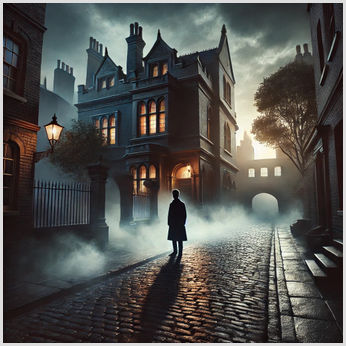Robert Louis Stevenson wrote The Strange Case of Dr. Jekyll and Mr. Hyde in 1886. It is a famous novel and a defining work in Gothic horror. Set in Victorian London, the story follows the legal practitioner Gabriel John Utterson as he investigates unusual occurrences between his friend Dr. Jekyll and the criminal Edward Hyde.
The novel is rich with themes, including good versus evil, human nature's duality and the consequences of scientific experimentation. The reader is encouraged to see what lies beneath the surface of even the most admired people through the character of Dr Jekyll, a well-respected scientist.
The Jekyll and Hyde themes explored are suitable for all major GCSE exam boards, including AQA. If you need support in your GCSE English Literature revision, TeachTutti has specialised English Literature GCSE tutors who can help you revise and learn this topic.
Duality of human nature
Stevenson believed that every individual has good and evil with them. Dr Jekyll is a respected scientist and gentleman. Despite the outward appearance of morality, he hides darker desires. To explore these urges, he creates Mr Hyde, allowing him to express his worst qualities with no moral restraint.
His experiment with Mr Hyde soon spirals out of control as Jekyll can't contain Hyde. In the quote below, Jekyll recognises the duality inside him but that he can't reconcile these identities. It is a warning by the author that the repression of inner conflicts only strengthens them and leads to destruction:
"man is not truly one, but truly two"
The setting of Victorian London also reflects this theme. Respectable streets are often next to poorer, shadowed areas, an outward presentation of duality in human nature and society.
Good and evil
The conflict between good and evil is present throughout Stevenson's novella. Jekyll is the prime example of respectability in Victorian civilisation: he is polite, charitable and veneered. Meanwhile, Mr Hyde is evil, committing violent acts with no regard to morality or consequence.
In Dr Jekyll's reflection below, he realises he is both good and evil, two counterparts he can't separate. Jekyll is free when he acts on his impulses with Hyde. However, soon he can't suppress the destructive influence of Hyde, which seeps into his outward life:
"I learned to recognise the thorough and primitive duality of man; I saw that, of the two natures that contended in the field of my consciousness, even if I could rightly be said to be either, it was only because I was radically both."
Mr. Utterson and Dr. Lanyon are horrified by Hyde because he represents an evil that shakes their sense of order. Stevenson uses Hyde to suggest evil is a potent force lying beneath the surface of every person. The cruelty of Hyde and the inability of Jekyll to restain him implies that ignoring darker impulses only makes them stronger and we should instead strive for self-awareness and moral balance.
Science vs nature and the supernatural
Stevenson explores Victorian anxieties about the rapid advancements in science and their impact on humanity. Dr. Jekyll’s creation of Mr Hyde shows the tension between scientific development and respect for natural order. Jekyll uses science to repress his dark impulses. This defies the laws of nature, creating a supernatural being in Mr Hyde who is beyond both nature and moral constraints.
Dr. Lanyon reacts with horror when he witnesses Jekyll’s transformation into Hyde. Lanyon is a conventional scientist who adheres to reason. He describes the experience as something his rational mind can't comprehend:
"I saw what I saw, I heard what I heard and my soul sickened at it."
Lanyon’s shock reflects the terror Victorian society felt towards scientific experimentation that challenged morality and religion. Lanyon believes Jekyll’s actions are a perversion of science that defies the laws of nature. It even leads to Lanyon's death as he grows ill in revulsion at what he has seen.
Stevenson uses this theme to warn of humanity's overreach and the dangers of attempting to control or transcend natural boundaries. Jekyll’s downfall implies that nature can't be undone and that science can be a dangerous tool when it oversteps its moral limits.
Reputation and secrecy
A respectable public image was prized in Victorian society. This pressured people to conceal behaviours or desires considered unacceptable. The creation of Mr. Hyde is a way for Dr. Jekyll to explore his darker side. He can indulge in forbidden activities without damaging his social standing.
The symbol of locked doors is used in the novella to reinforce secrecy. Jekyll’s laboratory door is normally locked, which represents his protected hidden life as Hyde. Jekyll's friend and lawyer Mr. Utterson is confused when he hears about Hyde, but avoids investigating:
"If he be Mr. Hyde, I shall be Mr. Seek."
This quote shows Utterson’s internal conflict: he is curious but wants to protect Jekyll’s reputation. His protectiveness prevails and Jekyll’s dual life is only revealed at the end. This reinforces how the characters prioritise reputation over honesty and integrity.
Stevenson uses the theme of secrecy and reputation to critique Victorian society’s obsession with respectability. The lengths Jekyll takes to conceal his Mr Hyde imply that a fixation with outward appearance can lead to deception and self-destruction. Jekyll refuses to reconcile with his private desires, which leads to his tragic downfall.
Reason and the supernatural
Stevenson explores the conflict between the natural order and the supernatural borne from scientific experimentation. Jekyll’s transformation into Hyde creates a supernatural force that disrupts his life and those around him. Hyde does not have a natural human moral compass and represents someone who can't be controlled by society. He kills several people, including Sir Danvers Carew and tramples a young girl after a minor collision.
Dr. Lanyon is horrified when he sees Hyde transform back into Jekyll. The experience shatters his sense of reality, ultimately leading to his death. His reaction is a warning against tampering with the natural order and forces beyond human understanding:
"O God!" I screamed, and "O God!" again and again; for there before my eyes—pale and shaken, and half fainting, and groping before him with his hands, like a man restored from death—there stood Henry Jekyll!"
The theme of nature versus the supernatural also extends to the consequences Jekyll faces as he loses control over Hyde.
Final thoughts on Dr Jekyll and Mr Hyde
The Strange Case of Dr. Jekyll and Mr. Hyde explores duality, moral conflict and the consequences of scientific overreach. Through the character of Dr. Jekyll, Stevenson uses Dr Jekyll to explore the consequences of crossing the boundaries between good and evil, nature and the supernatural. Jekyll's morality and self-control unravel each time he transforms into Hyde. The author also critiques Victorian society, the emphasis on reputation and the suppression of desires seen negatively.
Ultimately, Stevenson’s novel is a cautionary tale, warning about denying or separating the complexities of our nature. Jekyll gives in to his darker side in Hyde, leading to their combined destruction.
To learn more about this novella, visit RevisionWorld for key quotes from Dr. Jekyll and Mr. Hyde. You can also learn more about the author by reading Brittanica's biography of Robert Louis Stevenson.
If you need more support learning this novel, TeachTutti has verified and qualified English Literature GCSE tutors. They can help you analyse and learn about the themes in Stevenson's book.
This post was updated on 10 Jul, 2025.

